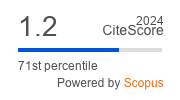On the Issue of Free Word Association Test Results' Validity
DOI:
https://doi.org/10.29038/eejpl.2017.4.1.samKeywords:
free association test, stimulus, reaction, association, validity.Abstract
In 2011 and 2016, two separate free association tests with the stimuli of an educational field took place. The received in-five-year data on the same stimuli are analyzed, classified and compared with the previous ones. The comparison is possible because the investigated social group was the same viz. the students of Zhytomyr State Ivan Franko University. The study tested the hypothesis that free association test results are valid (reliable, actual; after their checking they give the same results) for five years. After analyzing all the reactions of both experimental years to the stimuli discipline, tasks, knowledge, class, education, personality it appeared that some reactions were frequent and the others were individual. The most frequent reactions of the associative fields to the analogical stimuli of the 2011's and 2016's experiments coincide. For example, in both 2011's and 2016's experiments the most frequent correlative pairs S – r (stimulus – reaction) are: DISCIPLINE – order; behavior; TASK – home; KNOWLEDGE – mind; skill; CLASS – students; school; children; EDUCATION – higher; PERSONALITY – I; human. However, the more distant the associations are from the core reaction, the more diverse they are, and they display different frequencies in their associative fields of both experiments (in 2011 and 2016). Some associations which tended to the core reactions in 2011's experiment were not frequent in 2016's experiment, and vice versa. The widest variety, though, is found among the individual reactions of the two experiments; nevertheless, there are the same individual singular reactions of the experiments of both years. The total number of those individual reactions is the highest in the experiments.Thus, the hypothesis of data validity of a free association test is confirmed but only for the core reactions of associative fields. The more distant the associations are from the core reaction, the more dynamic and changeable they are.
References
- Горошко Е. И. Интегративная модель свободного ассоциативного эксперимента. –
М.–Харьков: ИЯ РАН–Каравелла, 2001.
Goroshko, Ye. (2001). Integrativnaya model svobodnogo assotsyativnogo eksperimenta
[An integrative model of a free associative experiment]. Moscow–Kharkiv: Institute of
Linguistics of the Russian Academy of Sciences–Karavella. - Денисевич О. В.. Лексика реклами в структурі мовної картини світу українців :
Автореф. дис. ... канд. філол. наук: 10.02.01. Луцьк, 2015.
Denysevych, O. (2015). Leksyka reklamy v strukturi movnoiyi kartyny svitu Ukraintsiv
[Vocabulary of advertising in the structures of Ukrainians’ worldview]. Extended Abstract
of Ph.D. dissertation. Lutsk. - Загородня О. Ф., Загородній Ю. В. Використання інформаційно-комп’ютерних
технологій для обробки даних асоціативних експериментів // Мова і культура. Вип.
18. Т.1 (176). К.: Видавничий дім Дмитра Бураго, 2015. С. 502–509.
Zahorodnia, O., Zahorodnii, Yu. (2015). Vykorystannia informatsiino-kompiuternykh
tekhnolohii dlia obrobky danykh asotsiatyvnykh eksperymentiv [The IT usage for data
processing of associative experiments]. Mova i Kultura, 18-1(176),
502–509. - Залевская А. А. Некоторые проблемы подготовки ассоциативного эксперимента и
обработки его результатов // Экспериментальные исследования в области лексики и
фонетики. Калинин: КГУ, 1971. С. 15–62.
Zalevskaya, A. A. (1971) Nekotoryie problemy podgotovki assotsyativnogo eksperementa
i obrabotki yego rezultatov [Some issues in preparation of an association test and
processing the results]. In: Experimental studies in the vocabulary and phonetics. (pp. 15–
62). A. A. Zalevskaya (ed.). Kalinin: Kalinin State University. - Караулов Ю. Н. Типы коммуникативного поведения носителя языка в ситуации
лингвистического эксперимента / Ю. Н. Караулов // Этнокультурная специфика
языкового сознания. – М.: Институт языкознания РАН, 1996. C. 67–98.
Karaulov, Yu. (1996). Tipy kommunikativnogo povedeniia nositelia jazyka v sytuacyi
lingvistichedkodo eksperimenta [The types of communication behaviour of a native
language-speaker in the linguistic experiment setting]. In: Etnokulturnrya Spetsyfika
Yazykovogo Soznaniya, (pp. 67–98). Yu. Karaulov, (ed.). Moscow: Institute of Linguistics
of the Russian Academy of Sciences. - Кушмар Л. Лексика економічної сфери в мовній картині світу українців : Автореф.
дис. ... канд. філол. наук: 10.02.01. Луганськ: Луган. нац. ун-т ім. Т. Шевченка, 2011.
Kushmar, L. (2010). Leksyka ekonomichnoi sfery v movnii kartyni svitu ukraintsiv
[Vocabulary of economy in the structures of Ukrainians’ worldview] Extended Abstract of
Ph.D. dissertation. Luhansk: Taras Shevchenko Luhansk National University. - Недашківська Т. Є., Самійлик С. В. Проблема формування стимульного списку для
психолінгвістичного дослідження // Психолінгвістика: [зб. наук. праць. ДВНЗ «Переяслав-Хмельницький державний педагогічний університет імені Григорія
Сковороди»]. Переяслав-Хмельницький: ФОП Лукашевич О.М., 2015. Вип. 18(2). С.
61–73.
Nedashkivska, T. Ye. & Samiilyk, S. V. (2015). Problema formuvannia stymulnoho
spysku dlia psykholinhvistychnoho doslidzhennia [The issue of stimulus list forming for a
psycholinguistics research]. Psyholingvistyka, 18(2), 61–73. - Недашківська Т. Є. Прикладний аспект психолінгвістичних досліджень//
Психолінгвістика. 2001. Вип. 8. C. 127–133.
Nedashkivska, T. E. (2011). Prykladnyi aspekt psycholinhvistychnykh doslidzhen [An
applied aspect of a psycholinguistic research]. Psyholingvistyka, 8, 127–133. - Терехова Д. І. Особливості сприйняття лексичної семантики слів: Психолінгвістичний аспект. К.: КДЛУ, 2000.
Terekhova, D. I. (2000). Osoblyvosti Spryiniattia Leksychnoyi Semantyky Sliv:
Psykholinhvistychnyi Aspect [Features of Perceiving Lexical Semantics of Words.
Psycholinguistic Aspect]. Kyiv: Kyiv State Linguistic University. - Фрумкина Р. М. Психолингвистика: Учеб. для студ. высш. учеб. заведений /
Р. М. Фрумкина. М.: Академия, 2001.
Frumkina, R. (2001). Psyholingvistika [Psycholinguistics]. Moscow: Akademia.











 Creative Commons «Attribution» 4.0
Creative Commons «Attribution» 4.0